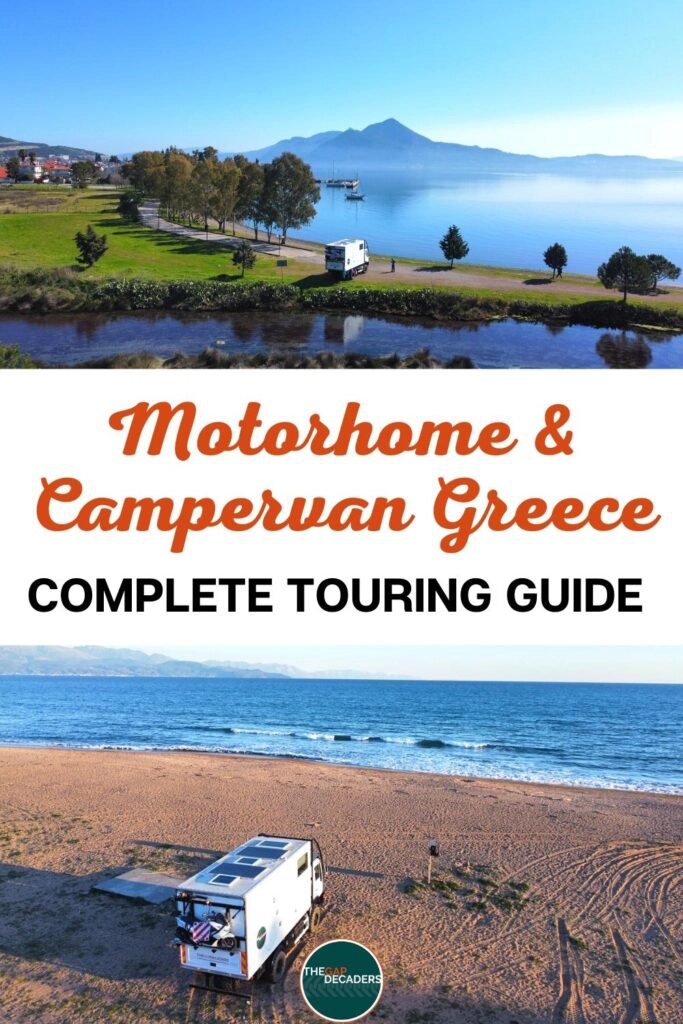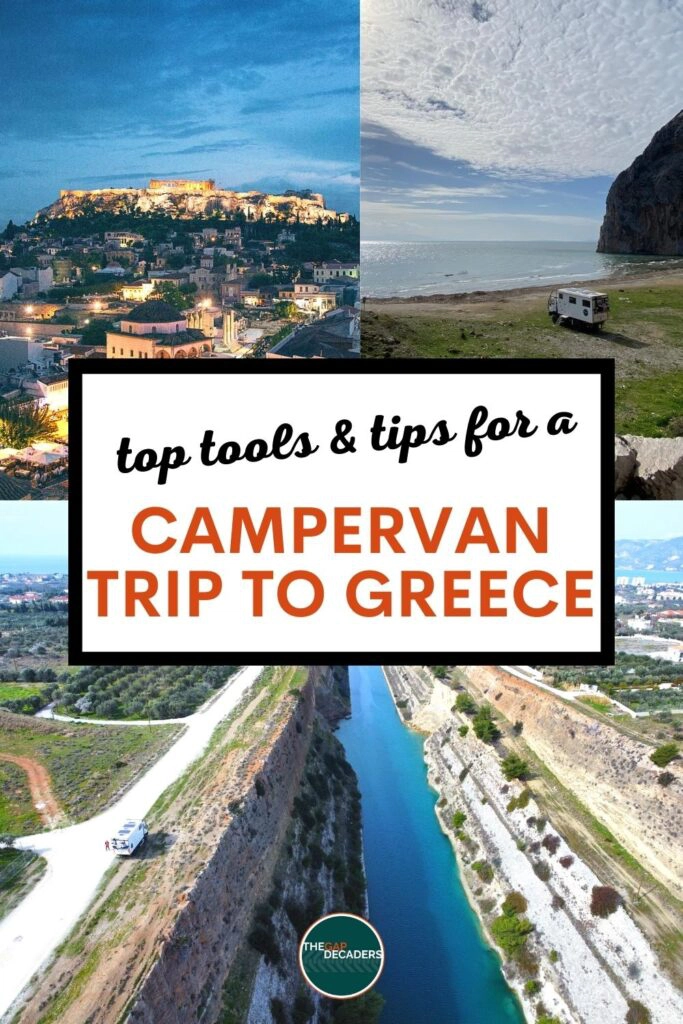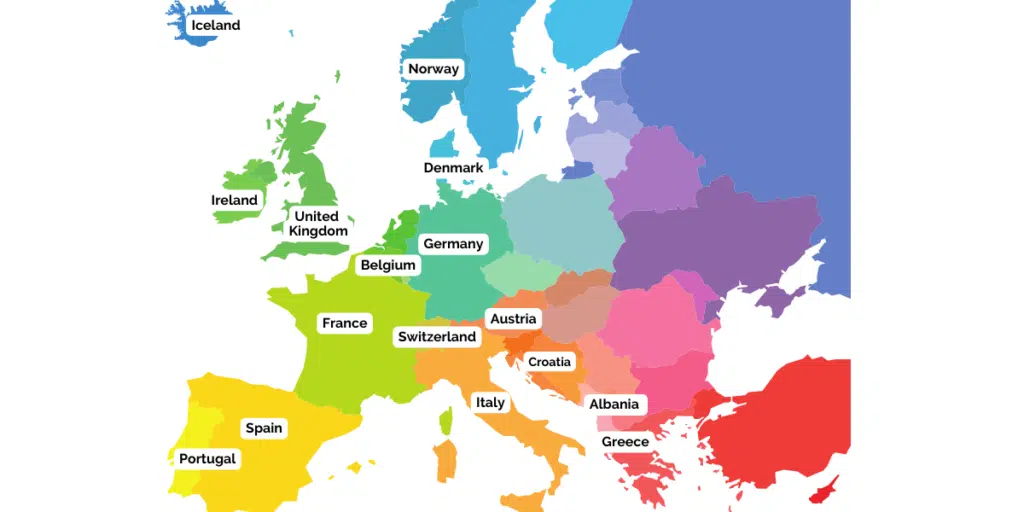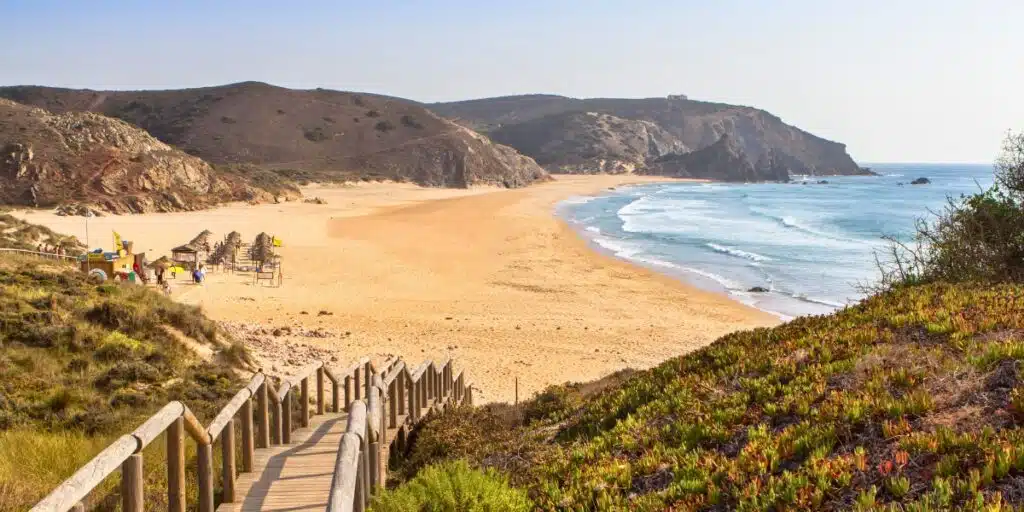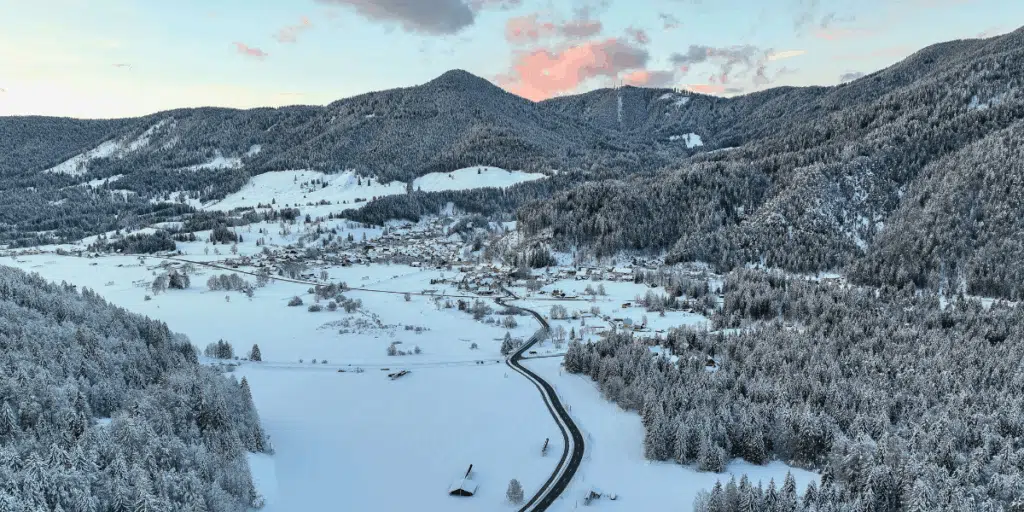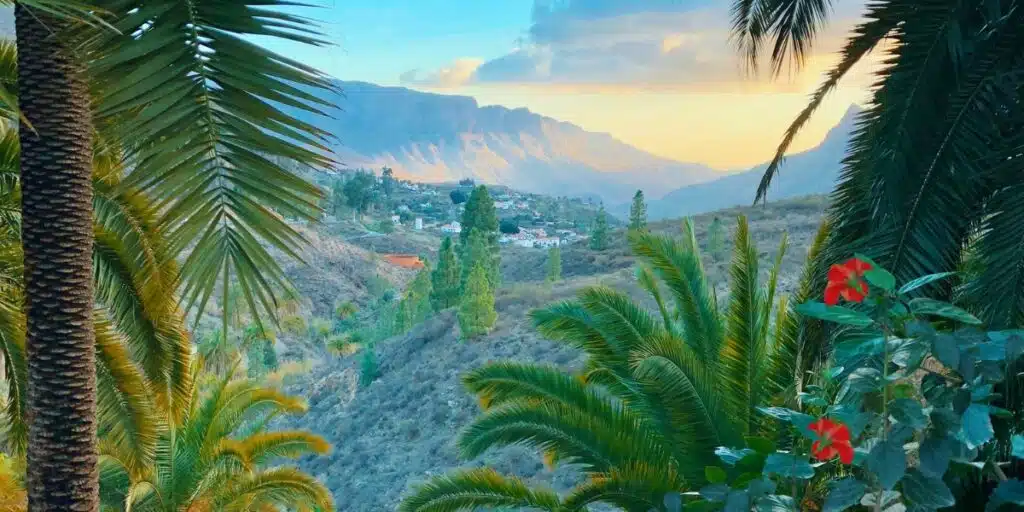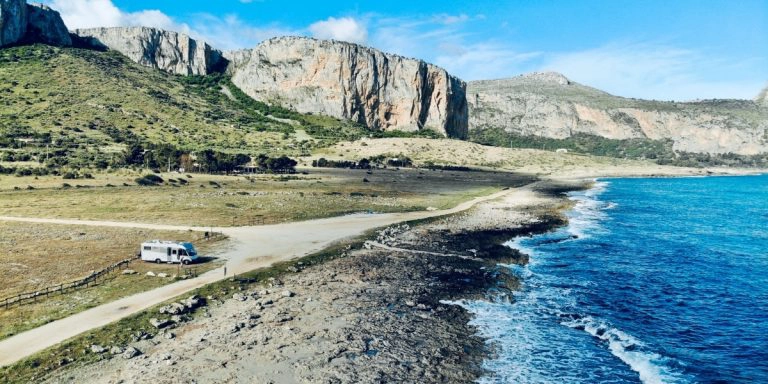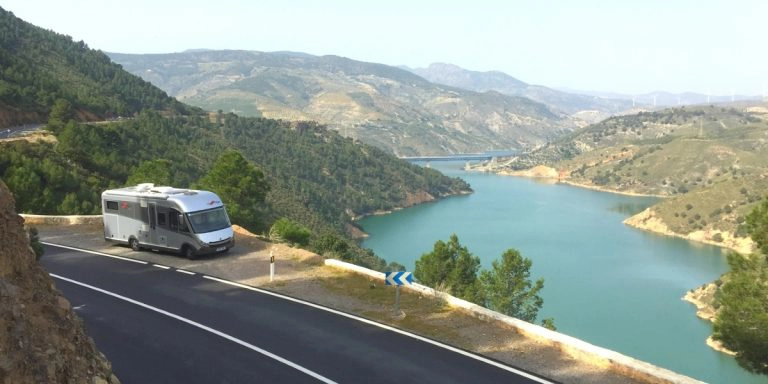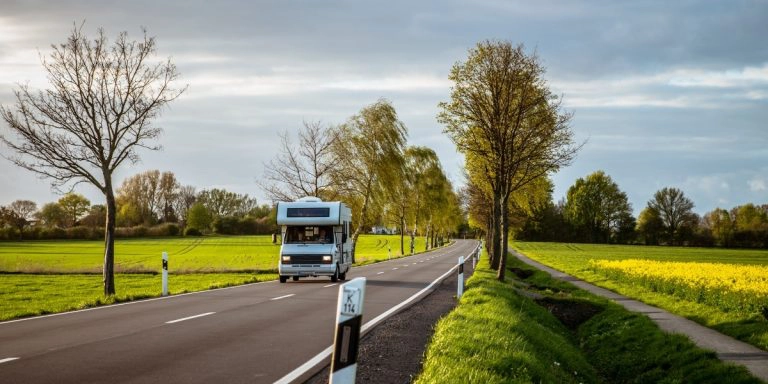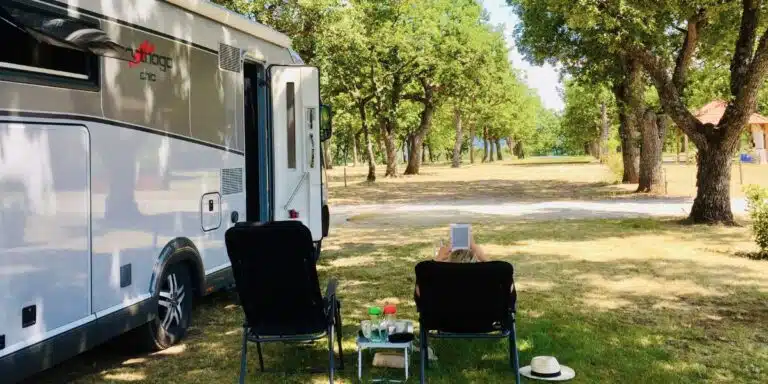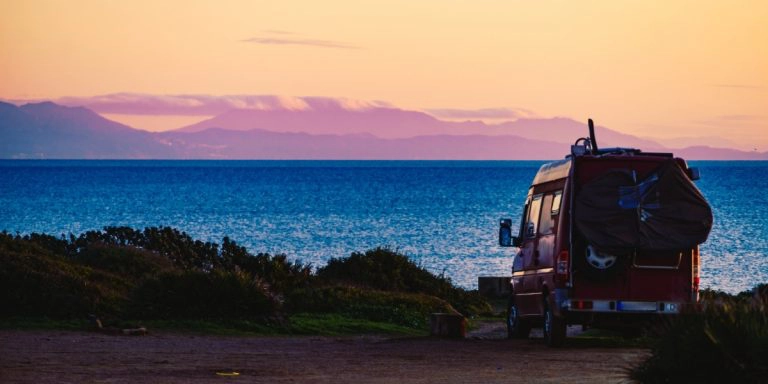This post may contain affiliate links, from which we earn an income. Click here to read our affiliate policy.
How to tour Greece in a motorhome & campervan
Greece is a wonderful country to tour if you like the road less travelled. Packed with ancient sites, beautiful beaches and turquoise seas, historic towns and cities, and majestic mountains, Greece is a country just waiting to be explored.
The landscape of mainland Greece is dotted with ancient Greek monuments and temples, UNESCO World Heritage sites, hot springs, roadside churches, lemon trees overhanging the roads, and traditional tavernas where you’ll be welcomed with open arms.
From the breathtaking scenery of the Peloponnese to the ancient history of Athens and Delphi, Greece makes for a remarkable and diverse motorhome tour.
In this guide, you’ll find lots of practical and helpful information about getting to Greece in a motorhome, and how to manage campervan and motorhome life there, including the 2025 changes to wild camping and what they really mean for you.
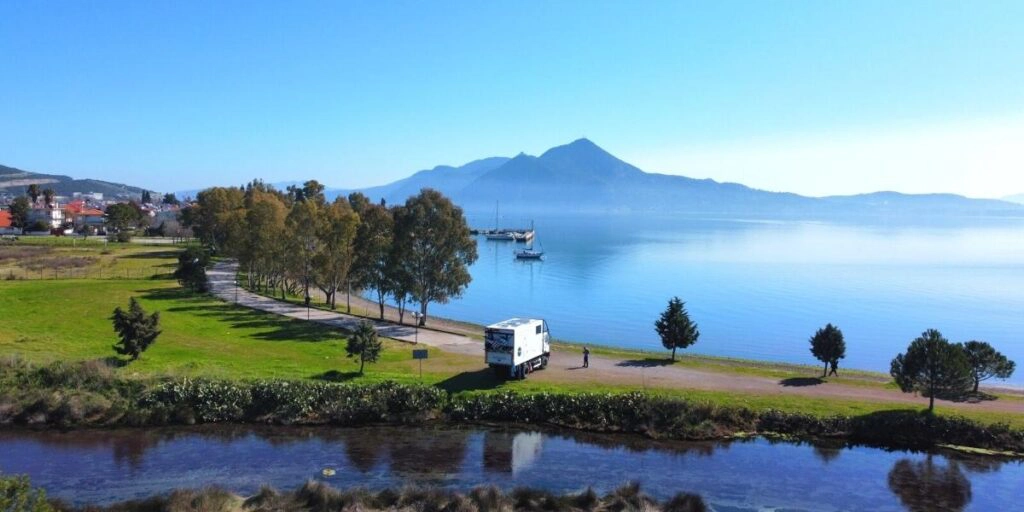
Driving a Motorhome to Greece
There are many, many road routes to Greece by motorhome or camper van, each with its own merits. The best motorhome route to Greece depends on how much you want to spend on tolls and fuel and how quickly you want to get there.
Motorhome Routes from United Kingdom to Greece
Through Italy
This is the most popular route to Greece, with the least amount of driving hours and no requirement to buy or arrange insurance for non-EU countries. Find out more in our driving to Italy from UK guide.
From Italy, you will need to get a ferry to Greece. You can sail from from Venice, Ancona, Bari or Brindisi to either Igoumenitsa or Patras – what routes are available depends on the season, with fewer routes operating in the winter months.
The shortest crossing is from Brindisi to Igoumenitsa and takes ten hours. Facilities on board are limited and cabins are expensive, although reclining seats are provided free of charge. Sadly, the last ferry operator that allowed you to sleep in your motorhome on deck withdrew this option at the start of 2025.
We recommend using Direct Ferries to find and book your ferry to Greece. They offer a huge range of crossings from many providers, allowing you to find and compare all the best deals and availability in one place.
Tips for Getting the Ferry
Getting a ferry from Italy to Greece is nothing like catching the P&O from Dover, or even Brittany Ferries from Portsmouth to Santander!
Through The Balkans
The quickest and most direct driving route into western mainland Greece is through the Balkan states. From Slovenia, follow the coast road south through Croatia, into (briefly) Bosnia and Herzegovina, Montenegro, Albania and then Greece.
Your motorhome insurance will provide third-party cover for Slovenia, Croatia and Bosnia and Herzegovina, and your insurer may also be happy to cover you comprehensively in these countries.
You will need to purchase insurance for Montenegro and Albania, which can be done at the border (although usually only third party), or through a specialist company in the UK.
Other routes include going through Hungary into Serbia and then North Macedonia, although this is a slightly longer route and still requires you to purchase insurance for North Macedonia.
Fly & Hire a Campervan or Motorhome
Flying and hiring a motorhome is the best way to tour Greece if you don’t own one, or don’t fancy the long drive south. There are a few well-reviewed companies offering motorhome rental and campervan hire in Greece.
Motorhome Greece & Brexit
Although the UK left the EU at the beginning of 2020, because the pandemic came swiftly on its heels, many of us are still realising the repercussions and getting used to how it affects travelling in a motorhome. You can find out all the details you need in our guide to motorhoming in Europe after Brexit. In the meantime, here are a few frequently asked questions and answers:
Do I need a visa for Europe?
Nothing changes with your passport, but from 2025, the EU will introduce the ETIAS (European Travel Information and Authorisation System), which will be an additional entry requirement for visa-exempt travellers and will involve the traveller registering their details online before travelling, mainly for security purposes.
How long can I stay in Europe?
UK citizens can only stay in the Schengen Area (a zone in Europe where countries have no internal borders and allow the free and unrestricted movement of people) for 90 days in every 180 days in the Schengen Area.
The 90 in 180 day rule works on a rolling basis and it can be difficult to work out whether you are within the rules or not, especially if you have visited the Schengen area on several occasions in the preceding 180 days.
What food can I take in my motorhome to Greece?
The European Commission says the following:
- Travellers are not allowed to bring in meat, milk or their products.
- There is an exemption for powdered infant milk, infant food, and special foods or special pet feed required for medical reasons if weighing less than 2kg and provided that:
- such products do not require refrigeration before opening.
- that they are packaged proprietary brand products for direct sale to the final consumer, and
- the packaging is unbroken unless in current use.
- For fishery products (including fish and certain shellfish such as prawns, lobsters, dead mussels and dead oysters), travellers are allowed to bring in up to 20kg or the weight of one fish if this is higher.
- For other animal products, such as honey, live oysters, live mussels and snails, travellers are allowed to bring in up to 2kg.
Can I use my mobile data in Greece?
It very much depends on who your mobile phone contract is with and when you started the contract. All UK providers now limit data usage in the EU in some way or another, and it’s best to check with your provider to make sure you don’t run up a big bill. You can find lots of information in our guide to the best SIM cards in Europe, especially if you’re planning to be away for more than a few weeks.
We have been using and recommend ConnectPlus for cloud SIM connectivity in the UK and Europe. You can choose from unlimited data packs to just single days, depending on your needs. The device is no larger than a slimline smartphone, connects with up to ten devices, is charged easily with a USB and can be delivered within a few days of ordering. Use the code ‘thegapdecaders’ at checkout to get 50% off in the first month!
Can I take a pet to Greece in my motorhome?
Yes, you can take dogs, cats and ferrets to Greece. You’ll need to book a pet-friendly cabin or kennels on the ferry or travel via the tunnel. Your pet will need a microchip, a valid rabies vaccination and an animal health certificate (AHC).
It can take some time to get all the documents together and the vaccines organised, so make sure you start the process well in advance. You can find out more about travelling with pets on the Gov.UK website.
More motorhoming in Greece travel advice and guides;
When to Visit Greece in a Motorhome
Greece can be blisteringly hot in the height of summer and freezing in the winter when the weather can be unpredictable.
April and May will bless you with perfect weather if you stay out of the mountains. July and August are the hottest and most crowded months, especially in Athens and the islands, when Greeks also take their annual holidays.
We think the late spring and autumn are the best times for a Greece road trip. It will be warm in the day, with little rain, but you will need a fleece for the cooler evenings.
October and November may be OK in the south but the mountains will have snow and evenings will be cold. December and January may be warm but unpredictable in Greece – if the warm African winds blow north, you’ll have lovely sunny days, but if they don’t, it will be pretty chilly.
Visit in February for carnival (apokriátika) season. The celebrations span three weeks, ending during the seventh weekend before Easter. Patras Carnival is one of the largest and most flamboyant in the Mediterranean, and the third largest of its kind in the world!
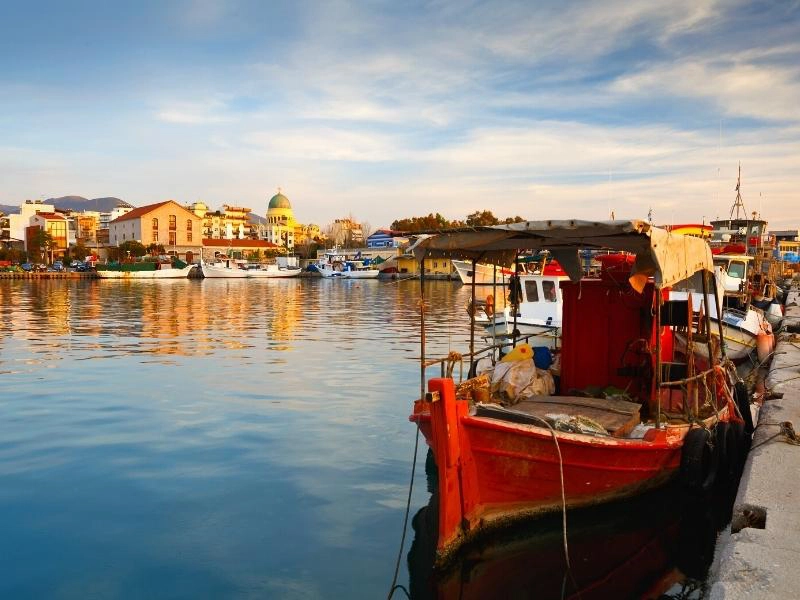
Driving a Motorhome in Greece
The quality of the roads and the abilities of Greek drivers are mixed. Motorways in Greece have received a lot of EU investment in recent years, and on the whole, are in good condition. The same cannot be said of other roads, even the national road network.
Expect potholes, uneven surfaces and the occasional time when the road just becomes a track, before becoming a road again!
Greek Speed Limits for Motorhomes
Always observe the speed limits when campervanning in Greece. There are speed cameras just as in the UK, and the Greek authorities have been known to pursue Brits for non-payment of fines. This has not changed since Brexit as the information-sharing agreement with the DVLA continues.
Motorhomes < 3,500 kg
Motorhomes > 3,500 kg:
Documents You Need for a Greek Road Trip
Vehicle Safety Equipment for Greece
Tips for Driving a Motorhome in Greece
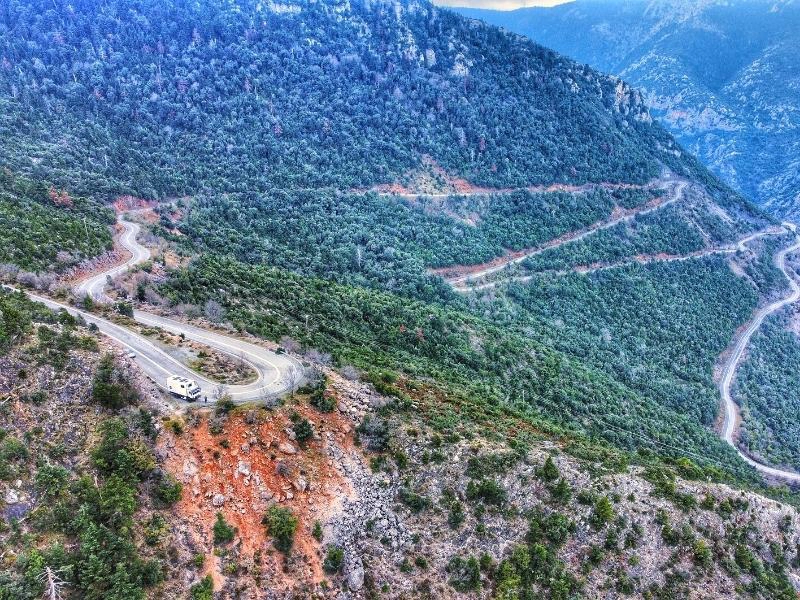
Toll Roads in Greece
Tolls are more expensive than in Spain but cheaper than in France. Tolls are levied for most motorways, the Rio-Antirrio Bridge and the Aktio-Preveza Tunnel. In Greece, you pay a fixed amount in advance to access to motorway, there are no payment booths as you exit.
If you have a specific destination you need or want to get to, it is far cheaper, easier and quicker to take the toll roads due to the sometimes poor construction of lesser roads and the price of fuel. Otherwise, slow travel and get off the beaten path, and you’ll see some spectacular sights.
Most motorhomes and campervans will generally be classed as Category 3, which covers vehicles with two or three axles, with or without trailers, and over 2.2m high. You can find out more about categories and rates here.
Tolls can be paid by cash or card, or with an electronic toll tag, depending on where you are in the country. Motorway toll tags are transferable between the six toll operators in Greece, although in practice this does not always work. You can’t buy the tags online outside of Greece, but you can stop at a customer service point on one of the motorways. You can find out more about Greek tolls and providers here.
RELATED POST: Tolls for Heavy Motorhomes >3.5T in Europe: Country by Country Guide
Fuel in Greece
The price of diesel in Greece is around 10p per litre cheaper than in the UK. Prices vary across the country, from town to town, and from garage to garage – even when they are literally just up the road from each other!
You’ll always find fuel to be cheaper if you buy away from large cities and off the motorways, so shop around using an app like PetrolPrices, to find the best deal.
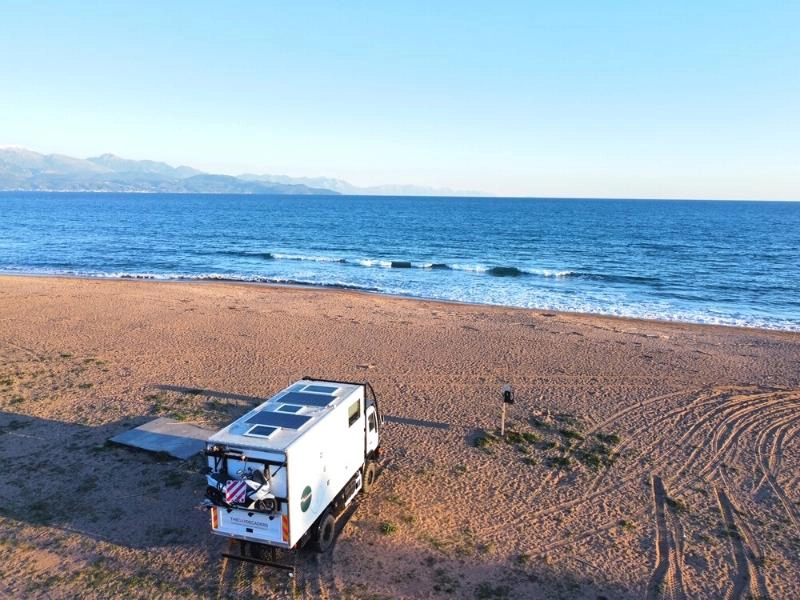
Motorhome Services in Greece
Fresh Water & Waste
Motorhome services in Greece are mostly confined to campsites, many of which are closed out of season.
However, there is fresh water available in many places, including garages, boat yards and picnic areas, and often you’ll find random taps along main roads where you can stop and fill up.
Most beaches have showers with a fresh drinking water tap attached. There is no issue with filling up using any of these methods, Greek people understand the need for water and are happy for you to fill up in this way.
Tap water in Greece is potable, although does contain higher levels of chlorine than UK tap water, so you may prefer to buy bottled water. Use Park4Night to find fresh water points.
In terms of disposing of grey waste, the negative connotations in the UK just do not exist in Greece. Greece is less populated than the UK and outside of cities and large towns, you’ll find lots of places where you can stop and dispose of grey waste safely.
Black waste is harder to dispose of out of season, as many public toilets are closed. If you plan on touring Greece, you should consider carrying a spare cassette or fitting a compost toilet.
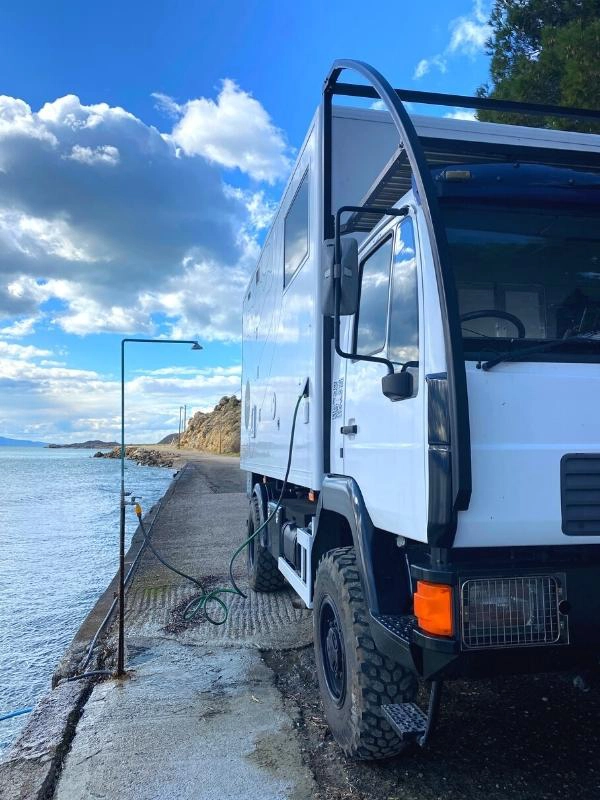
LPG & Bottled Gas
LPG (called GPL in most European countries) for refillable motorhome gas systems is available in many garages – use the myLPG app to search near where you are. The adaptor for your refillable system in Greece is the dish adaptor, the same one as for France and Italy.
Gas bottles are also widely available, with butane generally being the more popular because of the climate – butane is more suited to milder weather conditions but propane is better for cold weather as it burns at lower temperatures.
For Greek gas bottles, you will need a different regulator, available from most DIY or camping shops.
Motorhome Stops in Greece
Motorhome Aires
There are only a handful of motorhome aires in Greece, where you will find a full suite of services and a place to park for the night.
Wild Camping in Greece for Motorhomes
In early 2025, Greece introduced a significant crackdown on wild camping through Law 5170/2025, which came into force in January. This law explicitly banned wild camping and overnight stays in motorhomes or campervans on public land, including beaches, forests, roadside lay-bys, and archaeological areas.
The move was sudden and strict, with penalties starting at €300 and rising to €3,000, along with possible short-term imprisonment for repeat offenders. The law also prohibited parking more than one motorhome on private land unless the property is licensed as a campsite. This caused confusion and concern across the motorhome community, especially after fines were issued to several travelers early in the year.
In response to criticism and enforcement confusion, a revised law – Law 5209/2025 – took effect on 1st July 2025, aiming to clarify the distinction between legal parking and illegal camping.
The core principle remains unchanged: wild camping is still strictly illegal. This includes sleeping, cooking, or setting up chairs or awnings outside your vehicle, even if you’re parked legally. However, the new legislation now allows for parking, even overnight, under certain conditions, provided no camping behaviors occur.
The key updates in the July 2025 revision are:
Importantly, police are now expected to distinguish clearly between legal parking and illegal camping. So long as travelers do not extend awnings, cook outside, or otherwise “camp,” simply sleeping inside a parked motorhome is not considered an offence under the revised rules. That said, fines remain steep; €300 for initial violations, rising to €3,000 and up to three months in jail for serious or repeated breaches.
The vanlife community has welcomed the clarification, though many remain frustrated that true wild camping is still banned. While the risk of fines for merely parking has diminished, sleeping in your van is only safe where no outward signs of camping are visible. In other words: you can park and sleep, but keep everything inside and low-profile, per the illustration below.
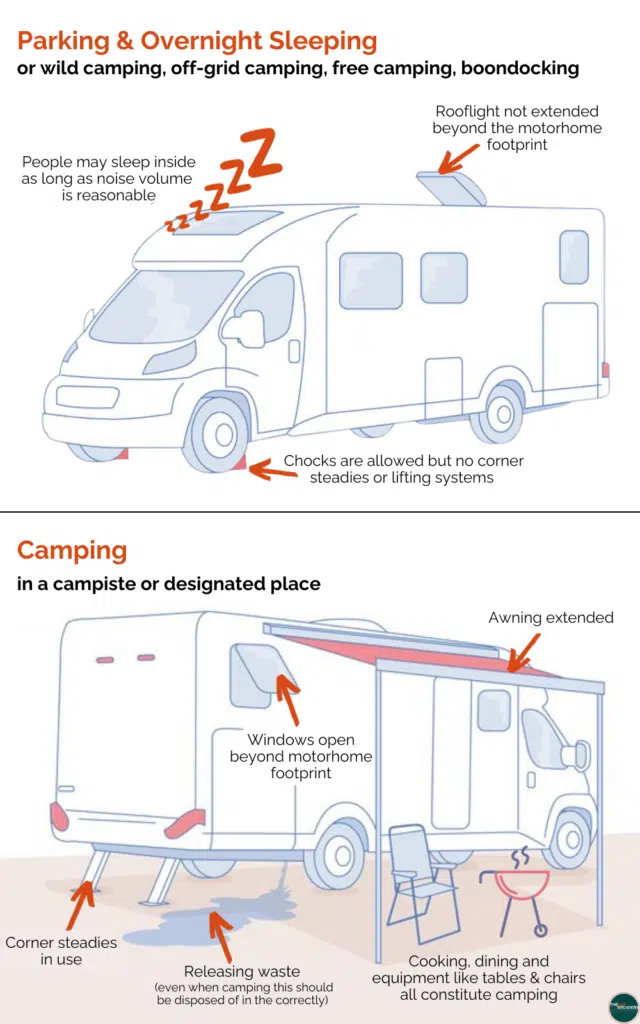
Only time will tell whether the wild camping we enjoyed in Greece prior to 2025 will be tolerated again. Outside of peak season, we found it possible to park wherever we wanted and get out our chairs and BBQ. Even in the most stunning destinations, there were few other motorhomes and campervans and we felt very welcomed by the Greek people.
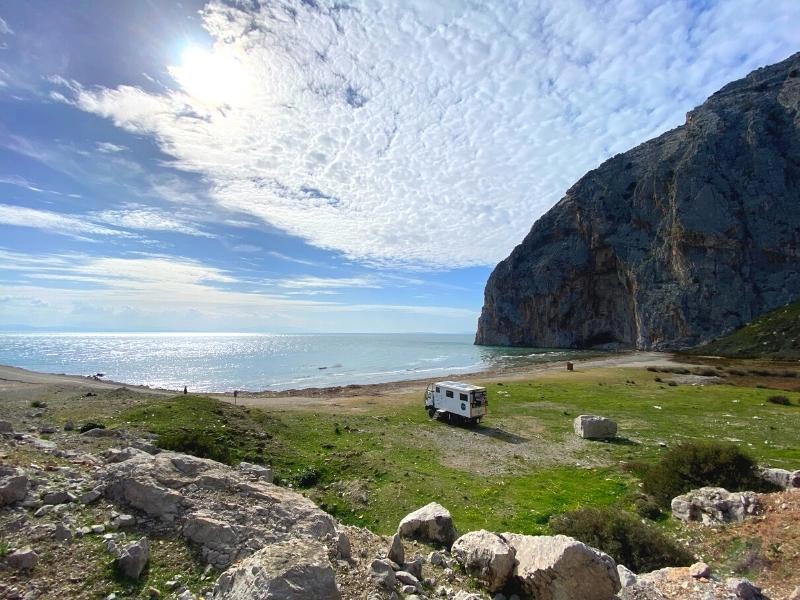
Campsites in Greece
Campsites in Greece are often only open between April and September. They are wonderful (and a necessity) in the summer months when people will want EHU for air conditioning.
Some campsites open across the winter but only have limited facilities. You may find just one sanitary block open, and the bar, shop and restaurant will be closed. The only staff will be a security guard manning the gate. This can work well if you need to plug in to top up batteries, or find a washing machine for the inevitable laundry!
Even though a campsite may be affiliated with ACSI and accept the rate during the low season, this will only be within their stated opening period in the ACSI guide, so you’re unlikely to benefit between October and March.
If you’re looking for campsites during the winter months, Park4Night is the best place to check whether a site is open or not.
Life in Greece
The ancient Greeks were known for their sophisticated sculpture and architecture and made important and long-lasting contributions to philosophy, mathematics, astronomy, and medicine. Today, family solidarity, generosity and hospitality remain deeply rooted in Greek culture.
Data and SIM Cards in Greece
If you need more than your UK roaming allowance, you can buy a data-only SIM card from a number of Greek providers. There are three main providers, Cosmote, Vodafone, and Wind. The first two offer the best coverage, but Wind tends to have the best deals.
Vodafone has shops in most towns, and you can pop in, with your passport, and find out their offers. We were able to buy a couple of 40GB SIMs for €20 on two occasions. The final shop we visited would not allow us to buy those, and we had to pay €12 for 8GB. Shop around and you may get a better deal at the time but don’t expect data to be cheap.
RELATED POST: An Easy Guide to Motorhome WiFi & Internet
Greek Travel Inspiration & Ideas
Top Greece Motorhome Destinations
Athens
We loved Athens. Undoubtedly, it helped that the sun shone, but this city is vibrant and alive with street culture and dominated by the incredible Acropolis, whatever the weather. Visit the ancient citadel as early as you can in the morning, for the opportunity to take photographs without hordes of people.
Secure places to stay for motorhomes in Athens are limited. We stayed here – a bus parking depot – but they are very accommodating, have good stable electricity and as much water as you need. It was surprisingly quiet at night, although the odd bus does come and go.
We travelled in by scooter but you can get a taxi into the centre of Plaka, the old part of Athens, in around fifteen minutes.
RELATED POST: One Day in Athens – Itinerary, Map, Tips & Guide
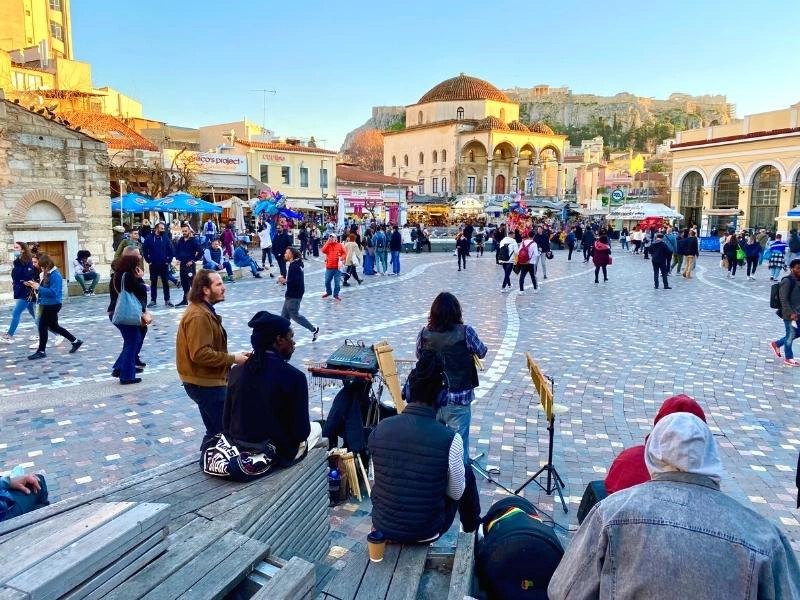
Peloponnese
The Peloponnese is the furthest south you can go on the Greek mainland. Connected to the rest of Greece by the magnificent Rio-Antirrio Bridge, which crosses the Gulf of Patras, and a road bridge which crosses the fascinating Corinth Canal, the Peloponnese is technically an island – just a large one!
You could spend months touring around the coast in a campervan – weeks devoted to each of the three fingers to the south wouldn’t go amiss, such is the depth of history and breadth of culture here.
The island is the stuff of legends and many civilisations have called the Peloponnese home, from the ancient Minoans and the riches of the Mycenaean and Byzantine eras to the Ottomans and everything in between, you’ll find it here.
Highlights of the Pelopponese include the birthplace of the Olympic Games, Ancient Olympia; the tower houses of the Mani, deep in the south of the middle finger; hiking the dramatic Vouraikos Gorge; the breathtaking Langada Pass from Kalamata to Sparta, and the pretty lovers town of Nafplio.
RELATED POST: One Perfect Day in Nafplio: Top Attractions & Hidden Gems
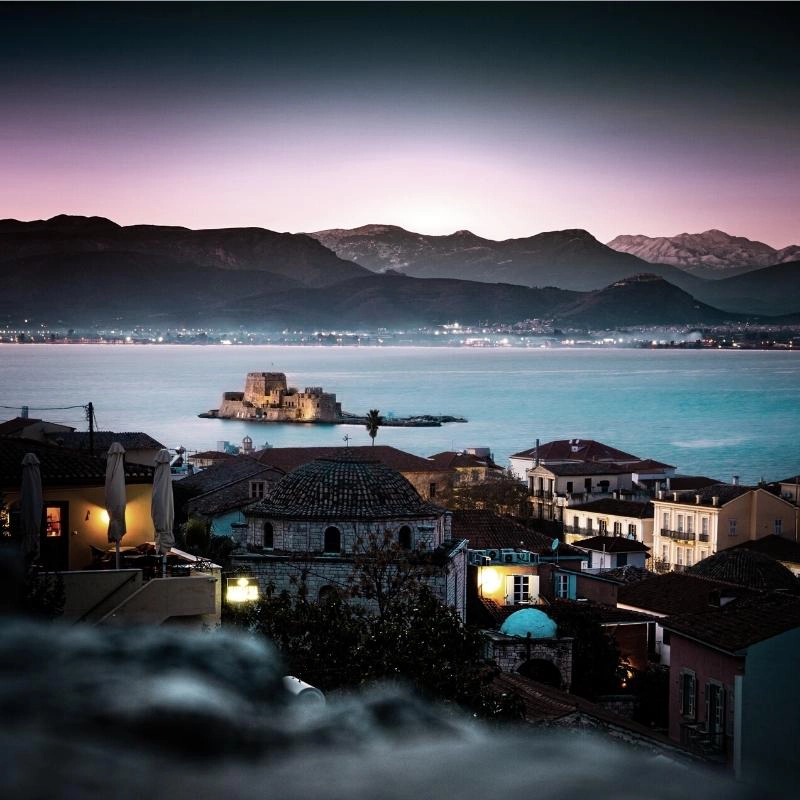
Central Greece
Central Greece is full of ancient sites, towering mountains, hot springs and Alpine-like valleys. Don’t rush through on the way to elsewhere, but stop and savour the diverse landscape, wonderful hospitality and gastronomic delights.
Ancient Delphi, one of the most important archaeological sites in Greece is here. Delphi was the centre of the ancient Greek world and is now a magical place to visit, surrounded by stunning scenery.
The Meteora region is just as magnificent, with towering rocky outcrops topped with impossibly positioned Byzantine monasteries – although don’t expect it to look like the pictures from beneath!
We also loved the Thermopylae hot springs, where there was also a bloody battle between the Persians and Greeks in 480 BCE, the pretty resorts of Galaxidi and Nafpaktos on the Gulf of Corinth, and the Ambracian Gulf for its slow and peaceful holiday vibe, and perfect position if you’re heading south from Igoumenitsa.
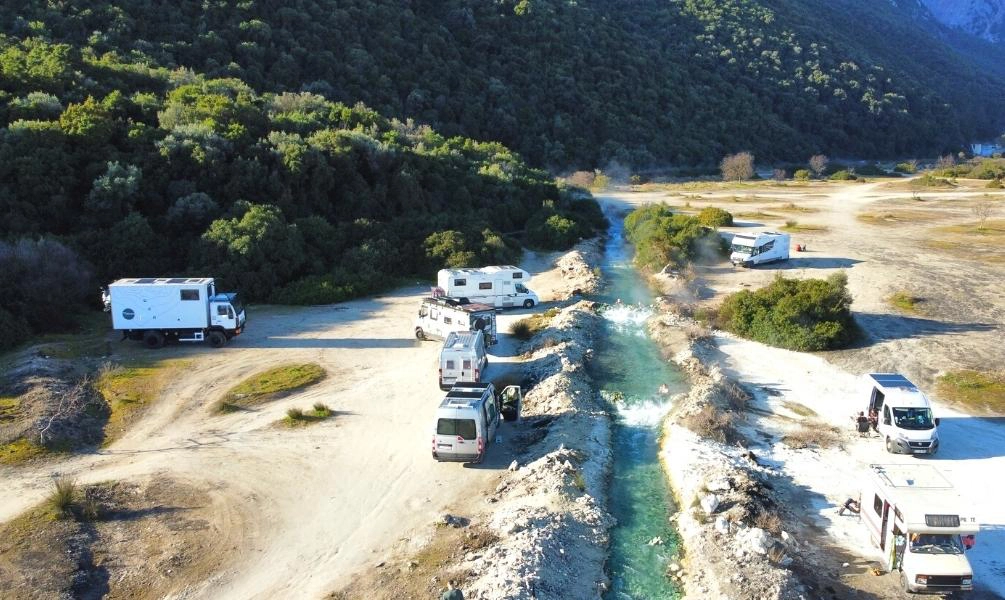
Northern Greece
Northern Greece stretches across more terrains and cultures than anywhere else in the country and will be on your right if you’re heading from Greece to Turkey. The mighty civilisations of the Macedonians, Thracians, Romans, Byzantines, Slavs and Turks have all helped to shape this region.
Here you’ll find lively cities like Thessaloniki and Xanthi, the stunning beaches of the Aegean coast, the mighty Mount Olympus, and one of Europe’s largest canyons, the Vikos Gorge.
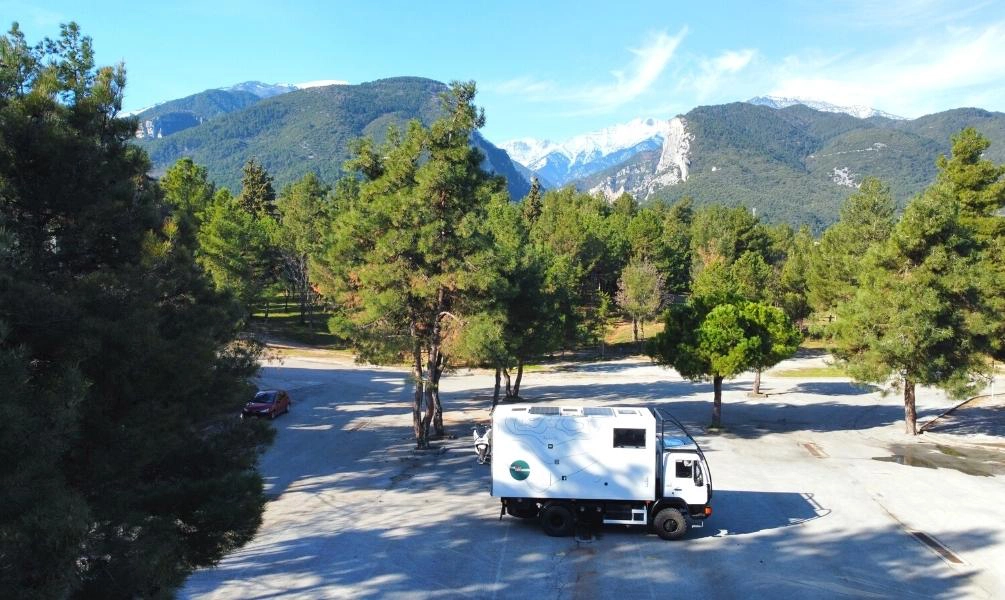
The Greek Islands
If you want to visit the islands, then you’ll need to do a bit of research to find the best routes, wild camping spots and campsites. We tried but found it quite hard work, especially for out-of-season island visits.
In the end, we found the costs associated with getting there outweighed the being there and stuck to the Greek mainland, which is just as beautiful. As our distant Greek relatives (aunt of my brother-in-law) told us, “you won’t see the real Greece on the islands”.
But, if you do want to experience a Greek island, you can get to Crete from Athens, and to Corfu from Igoumenitsa. Some of the smaller islands do not have ferries large enough for a motorhome, but a campervan may be possible. Use Direct Ferries to check routes and prices.
Lots of car ferries do not run in winter, so if you visit out of season, it will not be possible to visit many of the islands. Ferry fares for motorhomes tend to be quite expensive, so take this into consideration when you’re budgeting.
RELATED POST: 13 Best Greek Islands You Have to Visit!
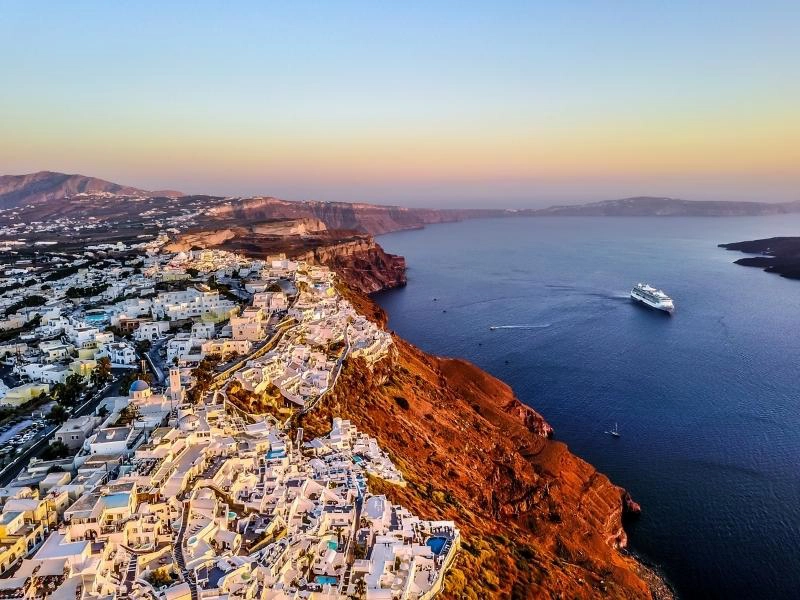
Are you looking for European motorhome touring guides? Check out these top posts…
Motorhoming in Italy: Your Complete Guide
Motorhoming in Spain: Your Complete Guide
Motorhoming in Germany: Your Complete Touring Guide
Touring Europe in a Motorhome: The Best & Only Guide You Need!
Motorhoming in France: Your Complete Touring Guide
Campervanning & Motorhoming in Portugal: Your Complete Guide
Love it? Pin it!
